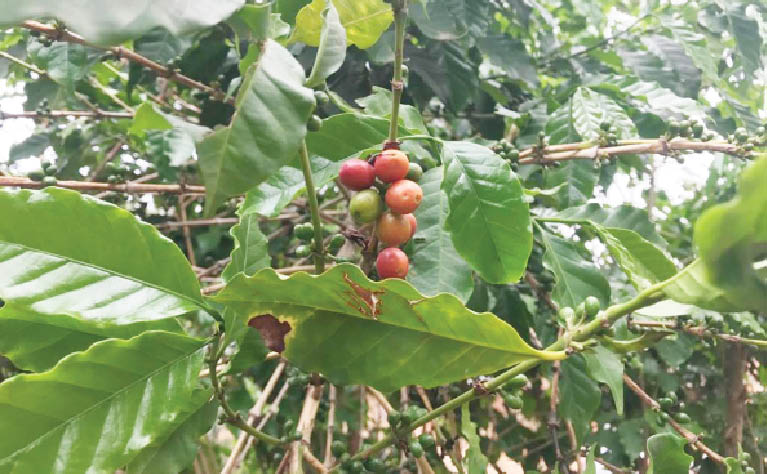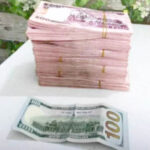At 68, Christopher Pam Chayi has remained loyal to coffee in over five decades. He has evolved from a subsistence coffee farmer to a commercial farmer in the Vom area of Jos south local government area of Plateau State, where many unofficially refer to as Nigeria’s headquarters of the coffee Arabica beans.
Plateau’s temperate and tropical weather condition makes it possible to produce all sorts of crops including exotic ones such as coffee, strawberries and other vegetables. Coffee can grow in nine local government areas of the upper Plateau which include the Northern Senatorial Districts and some parts of the Central District.
Chayi started growing coffee in 1963 but his oldest coffee tree was planted by his father in 1959 following his encounter with the European miners who settled in the Vom area. He is today one of the few farmers that still have faith in the crop even as many factors have discouraged others.

Right now, farmers in Jos North, Jos South, Riyom, Barkin Ladi, and Mangu local government areas are producing the coffee beans, though in low quantity. Across the country, coffee is known to grow in the Mambila Plateau of Sardauna local government area of Taraba State and Obudu in Cross River State. But one cannot compare the quantum of coffee beans that comes out from each of those LG’s when compared to nine local government areas in Plateau State, said Luka Kefas, the Director, Technical Service of the Plateau Agricultural Development Programme (PADP).
Ethiopia, where the coffee Arabica originated from is today the biggest exporter of coffee in Africa and fifth in the world. Coffee also accounts for 22 percent of the country’s commodity exports, according to the International Food Policy Research Institute.
The few commercial coffee farmers in Plateau State believe the crop has huge potentials and when harnessed properly, could form part of the state’s economic mainstay. Presently, this is hardly achievable because most of the farmers are peasant and have to contend with several challenges including diseases, lack of off takers, insecurity, poor yield as well as how to water the plant during the dry season.
Coffee is a perennial crop and grows twice a year when the plant is properly nurtured and watered throughout the year. But right now, the crop is only harvested once a year in Plateau State.
The farmers store their coffee beans in air tight containers and have been encouraged by Dung David Dayi, a consultant and processor to not only use a variety of organic manure but to sterilise sharp objects used in pruning trees so that diseases are not transferred from one tree to the next.
When asked about the application of fertilizer, Chayi made a repulsive expression and explained that manure was the best option as fertilizer could definitely fasten the growth of the tree but could also affect the coffee taste.
He said chemicals are used to spray the leaves against diseases, but Dayi who is also the Jos North Chairman of the National Coffee Association in the state has continued to convince farmers to instead go organic by using garlic, pepper and ginger mixed in water. “When you spray the mixture on the coffee leaves, it dries out the insects that may have perched on the leaves and that way, you can ensure that the coffee would pass laboratory tests and compete favourably in the international market,” said Dayi.
Most of Plateau’s coffee farmers have in the last 10 years abandoned the crop to pursue other crops for mostly what they described as the lack of assistance and investors to add to the value chain.
“Some even uprooted their trees because there was no assistance from government and no buyers. Because of the lack of off-takers and insecurity, other farmers had branched into other crop production that they feel could earn them instant money,” said Chayi.
Insecurity does not begin and end with the destruction of farmlands by animals especially cows alone, as Ali Dikwal who in 2008 invested a huge sum of money on his coffee plantation lost it when during an ethno-religious crisis, criminals took advantage of the insecurity and destroyed his farm. “I lost the about 70 trees I had planted and was already yielding beans together with my apple, guava, and avocado trees in the Kuru area of Jos South,” he said.
Dikwal, who has now abandoned coffee for rice, mangoes, Indian lemon and animal farming around Tilde in Bauchi State, said until he lost his coffee farm, he had also harvested, dried and stored most of the beans because there were no buyers.
“There were no government or marketing agents to even price it and those who came would complain that the coffee was not of the good quality and yet we were not given good seedlings. Then they said our coffee yield could not compete favourably with the internationally market,” he said.
Kefas, who spoke on behalf of the Programme Manager of the PADP, said they have delivered extension services to farmers by conducting Monthly Technology Review Meetings, adding that about eight years ago, “resource persons from The Cocoa Research Institute of Nigeria in Ibadan had been invited to discuss agronomics with the farmers.”
He said one of the mandates of the institute was in the area of coffee and on discovering that production was becoming acceptable among farmers, the problem became how to address the issue of excess beans which the Institute was again called upon to train about 200 farmers from Vom and Barkin Ladi on processing coffee to enable them market the product.
Kefas however said despite its prospects in Plateau State, the major challenge for coffee farmers still remains the lack of off-takers. He also said some of the farmers have now abandoned their farms and moved to the IDP camps due to insecurity leaving their farms at the mercy of heavy destructions by stray animals and wild fires.
Dayi, whose Kim’s coffee is gradually penetrating the international market is making Plateau proud but said he understands the need to produce quality coffee beans that will compete favourably with others.
He explained to our correspondent that his resilience and persistence on standard coffee beans had pushed some of the farmers to improve their yield which now gives him the premium coffee bean he requires to add value to the chain.
“When I started meeting the farmers, 95 per cent of the coffee I received in the first year were totally bad. I was looking out for the best quality and premium to add value to our indigenous coffee so gradually that has made some of the farmers to begin to improve their crop,” he said.
Dayi is however concerned that despite its potential in Plateau State, farmers could hardly produce two tonnes of the crop per year since they are unable to harvest twice a year. “Apart from the quantity, then you also have look at the quality of what we are producing in terms of international standard, there is a way the coffee beans is gauged; in terms of how whole the beans is, what is the colour and others. So you may get the volume but it may not get to the international standard,” he said.
The PADP however says there is hope for coffee farmers as last September, the state government went into partnership with Kaldi Africa, a Lagos based major off taker of coffee which they came in contact with thorough the Cocoa Research Institute.
Kefas said the company had distributed up to 35kg seedlings of a variety of coffee for Plateau farmers. which has been multiplied into nurseries. adding that, “we have seedlings of that improved variety and by the time we start producing, Kaldi will come and buy the coffee because that is the particular variety they want. Though it is also coffee Arabica but it is a different variety from the mostly mountain blue we have on the Plateau.”
He said any fear that the new variety will be cross-bread with Plateau’s indigenous variety and distort its identity was misplaced as the new variety was being nurtured independently from the indigenous coffee.
For 68 year old Chayi, he now worries that his goats find the coffee leaves of his nursery farm a delicacy and often consume it even when it makes them hyperactive. He now not only need assistance in the area of getting a water pump to water his crop during the dry season but also has to contend with the thought of how to fence his farm to keep his goats and other animals away.




